- Home
- P J Parrish
Dead of Winter Page 10
Dead of Winter Read online
Page 10
“He was doing a crossword puzzle when he was shot,” Louis said.
Jesse looked over at him. “Fred was a crossword freak. He was always working on those damn things.”
Louis knelt and used the end of his flashlight to flip the magazine aside. “Bingo,” he said.
The card was lying face down. Louis guessed it had been swept against the wall with the magazine when he opened the door. Fishing a pen from his jacket, he used it to turn the card over.
“Ten of hearts,” Louis said. He rose, his gaze traveling around the shanty. “There’s got to be a connection,” he said.
“Connection?” Jesse asked.
“Pryce was an active cop, but Lovejoy was retired. What’s the connection?”
“They’re both cops,” Jesse said.
“It’s got to be more than that,” Louis said. “We’ve got to search that cabin, top to bottom.”
He turned. Jesse was shaking his head.
“It’s there, Jess. All we have to do is —”
“I’m not going back in there,” Jesse interrupted, turning away. He took a deep breath. “I’m not going back in there.”
The sound of a siren drew Louis’s attention before he could reply.
“Chief’s here,” Jesse said quickly, leaving the shanty.
Louis emerged just as the Bronco pulled up in front of the cabin. Gibralter got out and started toward the front door.
“Chief! Out here!” Jesse called.
Gibralter stopped and turned, peering toward them. He started down the snowy bank and across the ice.
“How long was Fred retired?” Louis asked as they waited.
“About two years,” Jesse said. “Fred trained me. I liked the guy. Everybody did. Even the Chief.”
“The chief?”
Jesse nodded slowly. “They were friends, sort of. After Fred retired, they went fishing together sometimes.”
They fell silent.
“Jess, about the cabin,” Louis began.
“Drop it,” Jesse said sharply, and walked off toward Gibralter.
Louis frowned as he watched him go. What was going on here? What had caused Jesse’s reaction in the cabin? And why was he refusing to go back in? Then it came to him. Jesse hadn’t been sick from the smell. He was scared. Two of his colleagues had been gunned down. And for all any of them knew, whoever had done it wasn’t finished.
Gibralter and Jesse came back to Louis. “What’s going on?” Gibralter said, his eyes scanning the shanty.
“This is where Lovejoy was shot,” Louis said.
Gibralter’s eyes registered surprise. “Here? How do you know?”
But he didn’t wait for an answer. He stepped around Louis and looked inside the open door of the shanty. “Kincaid, hand me your flashlight,” he said.
Gibralter stepped inside, directing the flashlight over the chair and the jagged hole with its bloody edge. Then he slowly backed out of the shanty and turned to face Jesse and Louis.
“Fred was a good man. I could count on him,” Gibralter said tightly. He looked away abruptly, his eyes going back to the cabin, then up at the pines rimming the lake.
Louis watched him carefully, looking for a reaction, not just of a chief for a downed comrade but for a man mourning a dead friend. But Gibralter’s face remained composed and Louis didn’t know whether to feel pity or admiration.
“I want this entire area secured and searched thoroughly,” Gibralter said. “From the cabin to those trees.”
Louis scanned the shoreline. The area had to be at least a mile square. He caught Jesse’s eye and knew he was thinking the same thing. Gibralter was grasping at straws.
“Harrison, has Cedar Springs been notified?” Gibralter said.
“Yes, sir.”
Gibralter knelt and brushed a layer of powdery snow away from the ice. Visible on the surface were a few dark spots Louis thought at first might be blood. Gibralter stood, took a deep breath and blew it out in a white vapor. He looked at the sky.
“Anyone know the weather forecast?”
“Six inches by midnight,” Louis said.
“Well, we damn well better try to preserve something,” Giubralter said sharply. “I need these spots intact. Harrison, go get a broom from the cabin. I want the snow around this shanty carefully removed and the ice checked for evidence all the way to the shore.”
Louis was going to say that there had been two hard snows in the last week. But judging from the look on Gibralter’s face, logic wasn’t going to go very far.
“Want me to go get a fucking tent, too?” Jesse said.
Louis glanced at him, stunned by his sarcasm.
Gibralter glared at Jesse. “Do what I say, Harrison.”
Jesse trudged off across the ice.
“And watch where you step!” Gibralter hollered, standing and brushing the snow from his hands. He turned and peered back in the shanty’s door.
“Was there a card?” he asked after a moment.
“Yes.”
“Where was it?”
“Next to his chair, under the crossword.”
“What?”
“He was working the crossword puzzle, sir, when he was shot.”
Gibralter’s eyes grew distant. “Crossword,” he said softly. He turned away, his gaze wandering out over the lake. Louis watched his profile. Whatever emotion Gibralter was allowing himself to feel he wasn’t going to let anyone else see it.
After a moment, Gibralter turned back to face Louis. “Anything else?” he said brusquely.
Louis hesitated.
“You’ve got something on your mind, Kincaid. What is it?”
“It’s Jesse, sir,” Louis said.
“What about him?”
“When we were searching the cabin, Jess got pretty shaken up. I just think he —”
“I know Harrison better than you do, Kincaid,” Gibralter interrupted.
Louis nodded. “I know. It’s just that, well, I think he’s scared by all —”
“Scared?” Gibralter shot back. “He can’t afford to be scared. None of us can right now, Kincaid. There’s a fucking cop killer out there.”
“Chief, with all due respect, I don’t think you can fault a man for being —”
“Two men, two of my men are dead!” Gibralter yelled. “I want this fucker found now! I don’t care what it takes! If it means Jesse gets down on his hands and knees and examines every fucking inch of this ice, or you climb every fucking pine tree in those woods then you’ll do it, you hear?”
“Yes, sir,” Louis said.
Gibralter turned and started back to shore. He stopped and turned to Louis.
“Find him, Kincaid,” he said.
CHAPTER 10
It was almost eleven. Still no sign of her.
He had stood out on the porch for an hour, waiting for her to emerge from the fog that covered the lake. Finally, he went in. Now he sat slumped on the worn sofa, staring into the dying fire. A yellow legal pad lay on his lap, filled with notes about Pryce and Lovejoy.
He couldn’t get the images out of his head. Fred Lovejoy’s face as he lay frozen in the ice. Pryce’s face as he lay dead on the stairs, captured in the crime-scene photo.
And Jesse face. He couldn’t shake off that look on Jesse’s face after he had run from the cabin. Some cops were lucky enough to go their whole careers without pulling a gun or seeing a corpse, and living in a place like Loon Lake Jesse had probably never seen a dead man before Pryce. No, not just a dead man — a dead cop.
Louis let out a breath, thinking now of Gibralter. No matter how distraught he was about his friend Lovejoy he had been too hard on Jesse. Jesse had a right to be afraid. Hell, they all had a right to be afraid.
He stared vacantly at the television. The sound was off, the images throwing flickering shadows over the walls. He pulled the afghan up around his shoulders but nothing seemed to warm him. The cold came from somewhere inside him. It had started in Lovejoy’s cabin when he had seen
that dog. It had built in the shanty when he saw the bloody jagged hole in the ice. And it had finally overtaken him as he stood in the bitter cold and listened to Gibralter’s command.
Find him.
Find what? A monster who had murdered two men. A deviant who might kill again. A phantom who was as ephemeral as the fog. Louis tossed the legal pad aside, his feeling of impotence growing. He didn’t know what he was doing, where to start with this investigation.
Louis reached for his glass of brandy but it was empty. He pushed himself off the sofa to get a refill. As he trudged back from the kitchen, he spotted the box of books in the corner. He stared at it, something pricking his memory.
Setting the glass down, he knelt and started rummaging through the books, pulling out the blue paperback had had been looking for. The title was The Criminal Mind by Dean Franklin.
Picking up his brandy, Louis returned to the sofa and turned the book over to the back cover. Franklin’s penetrating eyes stared back at him, transporting Louis immediately back to the lecture hall at University of Michigan. The elective class was called “Investigative Analysis,” taught by Franklin, a retired FBI agent who believed that killers could be apprehended by understanding their psychological makeup.
Louis had taken it because he couldn’t get the elective he wanted, and he remembered thinking, like all the other students, that it was all hocus-pocus bullshit and that Franklin was a washed-up desk jockey put out to academic pasture. He had only half-listened to the craggy old agent who droned on about the brave new world of “criminal profiling.”
Louis stopped at a chapter called “Inside the Mind of the Monster.” He skim-read it, digesting its point that a profile of a killer could be constructed from evidence and tendencies like an abusive childhood.
Louis closed the book. Shit, so all he had to do was find some poor, mistreated dirtbag who had mutated into a cop killer.
He tossed the book aside, and his eyes drifted to the television screen. The eleven o’clock news was on, a feed from a station down in Lansing. It flashed a photo of Fred Lovejoy in the corner. Louis jumped up to turn up the sound but was too late. Great, Loon Lake had made the big time.
He watched listlessly through a series of other news stories, until a familiar graphic caught his attention. It was a blue-and-gold shield, the badge worn by Detroit police officers. Over it were the words “Drug Bust Gone Bad?”
The talking head blabbed on about cops and then cut to film footage of a tall man in a suit emerging from a building. He was stone-faced but strikingly handsome with reptilian eyes. The type under his face identified him as MARK STEELE, CHIEF CRIMINAL INVESTIGATOR FOR THE STATE POLICE.
Louis leaned forward. He vaguely remembered hearing about Steele during his days in Ann Arbor. Steele had headed an internal affairs case involving Detroit cops accused of brutalizing an innocent couple during a drug raid. The cops had been suspended; the couple settled out of court. But the episode had made Mark Steele’s career. The combination of his telegenic looks and the anti-police sentiment in Detroit was too potent for the media and politicians to resist. It was no secret the Steele wanted to be state attorney general, and he was paving his path to the capital with the crushed careers of cops.
Louis stared at the man’s flickering face. He suddenly remembered something he had seen in the locker room of the Ann Arbor station. Someone had cut a photo of Steele from the newspaper, smeared it with excrement and hung it on the bulletin board.
Steele’s face disappeared. The talking head moved on to a story about a puppy rescued from a drainpipe.
Louis turned off the television and sank back into the sofa. He reached for the glass of Christian Brothers, raised it to his lips and drained it.
A soft sound behind him made him freeze.
It had come from somewhere outside. He tensed, his ears alert. Nothing. Wind stirring the pines. Man, he was jumpy.
A thump. Out on the porch.
Louis set down the glass and with one quick move jumped up and flattened himself against the wall near the door. His eyes darted to his gun, visible on the dresser in the bedroom beyond. His heart hammered as he tried to put the image out of his head of Thomas Pryce opening the door to face his murderer.
A knock on the door. “Louis?” The voice was soft, female.
He exhaled and opened the door. She was standing there in the dark, her slender form encased in a parka, her round face framed in fur. Her eyes searched his face.
“Is something wrong?” she asked.
“No,” he said. He hadn’t realized it, but his body had been tensed, and now it trembled in relief. “Come in,” he said.
Zoe entered in the same wary manner as the first time. Her eyes darted around the room and back to him. “I knew you were here. I saw the smoke from the chimney.”
“It’s late. You shouldn’t be out alone,” Louis said.
“It’s safe.”
He shook his head. “No, it’s not safe, Zoe.”
“He’s not killing women, Louis, he’s killing cops.”
There was something in her voice, a matter-of-fact tone that stunned him. She hadn’t meant it to sound cold; her observation had come from pure innocence. It had come from something else, from sheer relief. He could see it in her eyes. I am not the target. I am safe. It struck him in that moment that he had seen the same look on other people’s faces in town, always women. He had seen it in Florence’s and Edna’s. He had seen it on the waitress’s face at Dot’s Café. They were distressed that a killer was in their midst but they were also relieved. We are safe. For once, we are not the target.
He shook his head at the irony. Women feeling safe to walk the streets in the dead of night when he and the other men — cops — trembled behind locked doors.
“Louis? What is it?”
“Nothing,” he said.
She was looking up at him, waiting for something.
“I didn’t think you would come back,” he said.
She smiled slightly. “I didn’t think so either.”
He glanced down at her boots. “You didn’t run?”
“No, I drove.”
He looked down into her dark eyes. For a second, he saw the dark hole in the ice hut. But this darkness was warm and he felt as if he could fall into it and drift down to some secret place where he could hide away from the cold.
“Can you stay?” he asked.
“For a while,” she said softly.
He helped her out of the parka. She was wearing jeans and a black turtleneck sweater. She rubbed her arms as she went to the fire. He hung up her coat and followed. As she sat down on the sofa he spotted the legal pad on the floor and kicked it under the sofa. He glanced to the bedroom. His holstered gun was on the dresser. He went to the door and closed it, returning to the sofa to sit by her side.
“Can I get you a drink?” he asked.
“Beer?” she said.
He went to the kitchen and brought back two Heinekens, sitting down next to her. He still felt edgy, like his skin was too tight. She was watching him as she sipped her beer, as if she sensed his tension.
“It’s cold,” he said, getting up to toss a log on the fire.
“I love the cold,” she said.
He looked back over his shoulder. “Well, you’re from Chicago so you’re used to it. I never seem to warm up.”
“Where are you from?” she asked, setting the beer aside.
“Michigan. But I was born in Mississippi.” He sat back down, acutely aware of her shoulder touching his. A surge went through him, electric, magic. Slowly, he felt himself starting to relax.
She turned to face him. She studied his face.
“What are you looking at?” he asked.
“Your bone structure. I’m an artist, remember?”
“Of landscapes, I thought.”
“Well, I’ve taken life-drawing classes.”
“Ah, nude men.”
“Lots of nude men.”
Her gaze travel
ed over him, down from his face. He held his breath. It was intimate, more erotic than if she had touched him.
“You have an athlete’s body,” she said.
“Used to. Out of shape now.”
She smiled, her eyes moving on.
“Your second toe is longer than your big toe.”
He glanced down at his feet in their tube socks. “You know what they say about that, don’t you?”
She laughed, then her eyes returned to his face. “You’ve got a white relative somewhere,” she said.
It caught him off guard. He thought of saying something flip but the warmth of her eyes stopped him.
“My father,” he said.
Her eyes held his. “Then you know,” she said softly. “You know what it’s like.”
She raised a hand and touched his cheekbone. She ran her fingers down his face, under his chin. He closed his eyes at the excruciatingly light touch.
When he opened his eyes, she was staring at him. The fire bathed her in gold. Tiny beads of sweat glistened on her high broad forehead. The soft tight curls of her hair formed a dark aureole around her head. She touched his lips. Her own lips parted.
He kissed her. He held her upper lip softly with his own, savoring it. When he let go, she leaned into him, placing her cheek against his. He could feel the fast rise and fall of her chest against his. Slowly, he raised his hand, brushing his fingers along the small curve of her breast.
“Can you stay?” he asked softly.
“For a while,” she whispered.
CHAPTER 11
Louis glanced at his watch. Only seven-thirty, still plenty of time before briefing. He got up and went to the coffeepot, pouring his second cup of the morning. Returning to his desk, he looked down at the papers and mail, the stuff he had taken from Lovejoy’s mailbox. Gibralter had told him to go through it, see if there might be something, some small clue.
Louis sipped the coffee, struggling to get his blood flowing, his mind working. He hadn’t slept more than a couple hours, but for once he didn’t care.

 South of Hell (Louis Kincaid Mysteries)
South of Hell (Louis Kincaid Mysteries)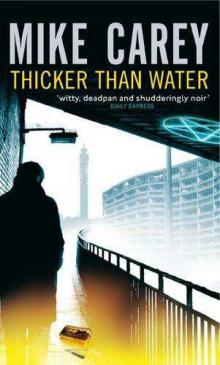 Thicker Than Water
Thicker Than Water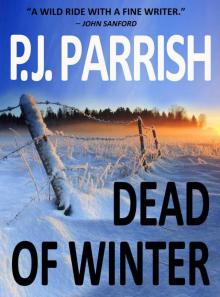 Dead of Winter
Dead of Winter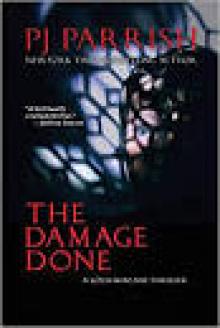 The Damage Done
The Damage Done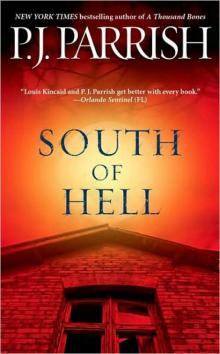 South Of Hell lk-9
South Of Hell lk-9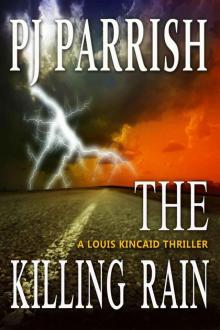 A Killing Rain
A Killing Rain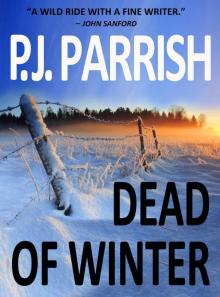 Dead of Winter lk-2
Dead of Winter lk-2 Island of Bones
Island of Bones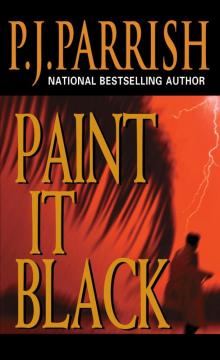 Paint It Black
Paint It Black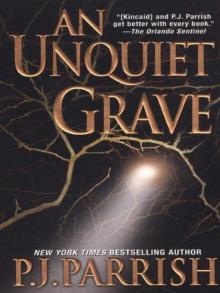 An Unquiet Grave (Louis Kincaid Mysteries)
An Unquiet Grave (Louis Kincaid Mysteries) She's Not There
She's Not There